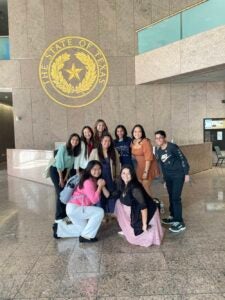During Minority Mental Health Month, we’re reaching out to civic organizers and advocates who are taking action to empower the voices of minoritized communities.
In this episode, we speak with Lily Trieu, interim executive director of Asian Texans for Justice (ATJ), a statewide nonprofit serving the Asian American Pacific Islander (AAPI) community in Texas, connecting them to civic action to build personal and political power.
Everyday Advocacy
 “I genuinely believe, regardless of where you work or what you’re doing from 9 to 5, anybody can be an advocate for their community in their own way,” says Lily Trieu, interim executive director of Asian Texans for Justice (ATJ).
“I genuinely believe, regardless of where you work or what you’re doing from 9 to 5, anybody can be an advocate for their community in their own way,” says Lily Trieu, interim executive director of Asian Texans for Justice (ATJ).
She acknowledges however, that historically, members of the Asian American Pacific Islander (AAPI) community have been reluctant to participate in civic action.
“What we have found is that the AAPI community and culture, the immigrant community especially, is very oriented toward ‘let’s not stir the pot, let’s keep our heads down, let’s not make any waves’,” Lily says. “This is largely because a lot of immigrants from Asia have lived through some terrible things. They’ve lived through war, poverty, and so on. When they come to the US, they just want to seek stability and safety. As a result, people don’t often feel empowered to take action.”
ATJ is working to empower the AAPI community, however, nurturing their confidence and strengthening their capacity for impactful civic engagement.
Asian Americans and Pacific Islanders in Texas
Nearly two million AAPIs live in Texas. They are the state’s most diverse racial group, made up of more than 50 ethnicities, speaking over 100 languages, and practicing dozens of different religions. They have different policy positions, identify with different political parties, and receive information from different sources as well.
At times this diversity poses a challenge to civic organizing and engagement.
“It’s something we struggle with all the time: how do we unite but also make space for our differences?” Lily says. “Organizing takes so much more learning and listening. It requires us to be culturally sensitive and competent, it requires us to invest in language translations and interpreters, it requires us to understand that while we may be passionate, we are not always the best messenger. Even though I identify as part of the community, I must learn every day about how to do this work better.”
Empowering Youth
The community is also relatively young, with 39 percent of the AAPI population in Texas between the ages of 18 and 34. It’s this demographic reality that makes TAJ especially committed to empowering the next generation of leaders.
The Civic Engagement Fellowship Program is the cornerstone of their efforts. This ten-week summer program trains AAPI youth ages 16 to 24 to become community organizers. Their most recent project focused on the importance of including Asian American Studies in Texas’ K-12 classrooms.
“After a summer of training and learning new skills, they had the chance to go in front of the State Board of Education to provide testimony,” says Lily. “They had the opportunity to share their personal stories as to why it’s so important to have this course taught.”
One young woman who studied Asian American studies at the college level testified about her struggles with bullying, anxiety, and mental health during her early school years. If she had had the opportunity to take an Asian American Studies course and learn about AAPI histories and identities when she was younger, she said, she would have had a stronger sense of self amidst the bullying she went through living in Texas.
“That was so powerful to me,” Lily says. “To see her claim her story, to claim her voice and to speak it loudly and proudly and make demands of elected officials. Those are the moments that really inspire us to continue our work with youth. We firmly believe that if we really want to create a world that’s more equitable and more just and safer and healthier for all, we have to empower young people to claim their voice, to claim their space, and make those demands of their community leaders.”
For the month of July, the Hogg Foundation is celebrating Minority Mental Health Awareness Month. We are highlighting stories that explore the efforts of diverse communities to improve community conditions that impact mental health, and what we all can do to make that happen.
Other resources:
- How We Should Respond to Anti-Asian Racism
- Into the Fold Episode 101: Asian American Identity in the Time of COVID-19
- Into the Fold Episode 115: Fear of Going Outside: A Podcaster on Asian Identity, Mental Health and Belonging
- Into the Fold Episode 132: Asian Americans Attaining Awareness
- Bridges, Not Barriers
- Sincerely, Hurt
- Moore Fellowship Winner Katie McCormick: Contributors of Occupational Stress and Burnout Among Texas Harm Reduction Workers
- Mind of Texas Episode 1: Minority Mental Health: Women Knowledge Workers in Higher Education Show Themselves Out
